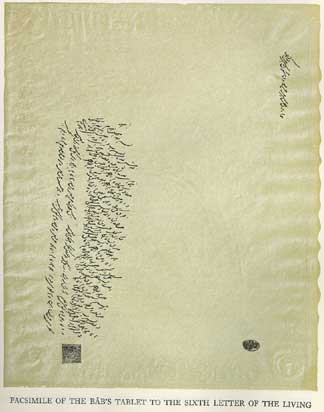
Muhammad Zarandí Nabíl-i A’zam (d. 1892), Tarikh ed. and trans. Shoghi Effendi Rabbani (d. 1957) as `The Dawn-Breakers: Nabil’s Narrative of the Early Days of the Bahá’í Revelation, (1932; Rep. Wilmette, IL, USA: Bahá’í Publishing Trust, 1996.
Tablet to the Sixth Haykal / Letter of the Living, Mulla Hasan Bajistani.
Beta Trans. Stephen Lambden, UC Merced, 199X+ 2021.
In progress and under revision
Last updated 30-07-2021.
[6]
Tablet to the Sixth Haykal / Letter of the Living,
Mullā Ḥasan Bajistānī.
[A]
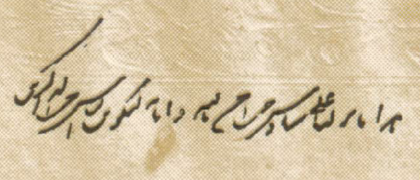
This is what We sent down unto the sixth who believed in God (sādis man āmana) and in His verses to the end that the people might assuredly come to be of the Dhikr [Remembrance] -related ones (al-dhākirīn)!
[B]
![]()
Huwa ("He is")
[C]
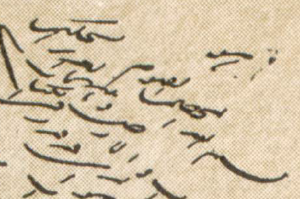
In the Name of God, the Help in Peril (al-muhaymīn), the Self-Subsisting (al-qayyūm)!
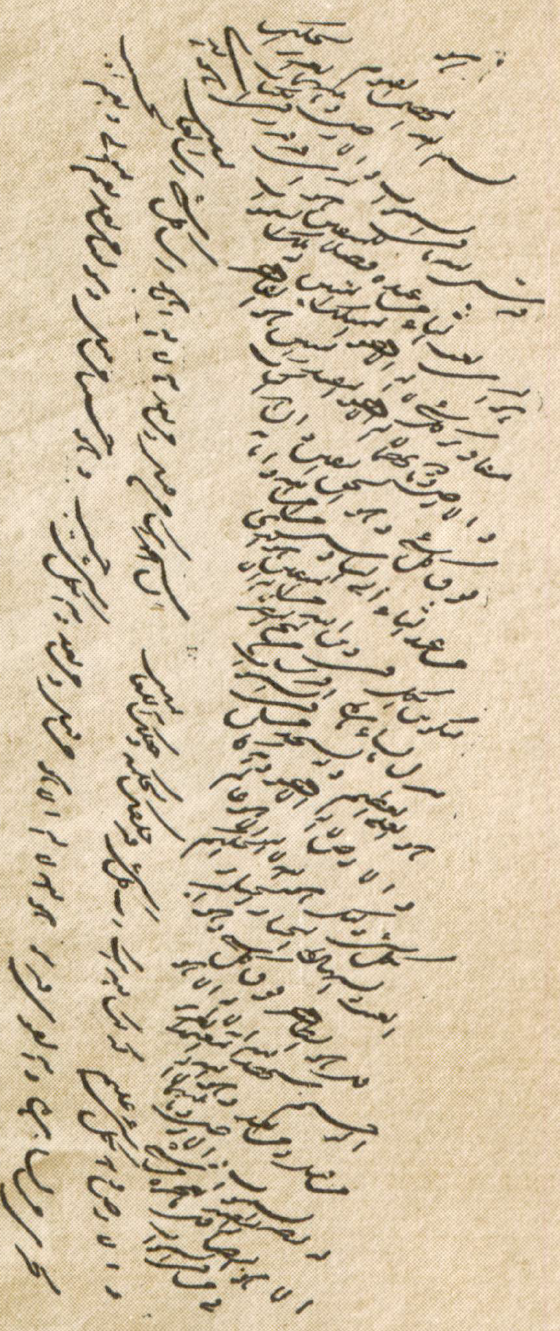
[I]
[1] Sanctify before God whatsoever is within the heavens and upon the earth and whatsoever lieth between them for He is the One Mighty (al-`azīz), the All-Wise (al-ḥakīm)! [2] He is the One who raiseth up the [letter] al-Thā' [ = the Thamara, the "Fruit", the Bab] from before Him, a Divine Bounty (faḍl an) for those possessed of certitude (al-muttaqīn [mutayaqqin]), [2] He is the One who ordaineth in the Book (al-kitāb) the measures of everything (muqādīr kull shay'). [4] No God is there except Him, the King Generating (maylik) [sic.], the Death-Imposing (al-mutayyin).
[II]
[1] His is the Dominion of the heavens and of the earth and what is other than these two. [2] No God is there except Him, the Powerful (muqtadir), the Clarifying [Expository] (al-mubayyin). [3] He is One Powerful (al-qāhir) above everything (kull shay'). [4] And He is the True One (al-ḥaqq), the Possessed of Certitude (al-yaqīn).
[III]
[1] This is a missive [letter, book] (al-kitāb) from the [letter] al-Thā' [ = Thamara, the "Fruit", the Bab] unto the sixth who believed in God (sādis man āmana) and in His verses, to the end that all might attain certainty within the religion of God (din Allah)!
[IV]
[1] He is the One Who sendeth down whatsoever He willeth by means of His Logos-Command (amr) more proximate [faster] than the twinkling of an eye (aqrab min lamḥ al-baṣar) [cf. Q. 16:79]. [2] No God is there except Him, the Exalted (al-`aliyy), the Mighty (al-`azīm)! [3] Before Him prostrateth whatsoever is within the heavens and upon the earth. [4] No God is there except Him, [5] And He is indeed a Patron (wakīl) of everything (kull shay')! [6] And He is God! [7] No God is there except Him, the Knower of the Unseen and of the Seen (`ālam al-ghayb wa'l-shahāda), the Chosen (al-mukhtār), the All-Compelling (al-jabbār), the All-Wise (al-hakīm).
[V]
[1] And He is the One Manifest (al-zāhir) above everything (kull shay'). [2] And He is the Beneficient (al-barr), the Compassionate (al-raḥīm)! [3] God testifieth that He, no God is there except Him both from times past and from times to come (min qabl wa min ba`da). [4] And He is God, the Supporter (al-mu`tamad), the Mighty (al-`azīz). [5] His is the Victory (al-naṣr) over the heavens and upon the earth and whatsoever lieth between them. [6] No God is there except Him the Supremely Victorious (al-naṣṣār), the Victor [Helper. Protector] (al-naṣīr}!
[VI]
[1] Say: He doth not reward with anything whomsoever is in the heavens or upon th earth. [2] He is indeed knowledgeable about everything (`alim). [3] Wherefore is God thy Lord, the Lord of everything (kull shay'), [4] He hath indeed created thee in accordance with His Decree (hukm).
[VII]
[1] And He made thee to be a Deity (ilah) relative to all the worlds (l'l-ālamin). [2] Inwardly (h-m-d from X ] doth He magnify thy Lord from times past and for times to come (min qabl wa min ba`da). [3] And He verily, no God is there except Him, the Lord of everything (rabb kull shay) and Lord of all the worlds (rabb al-`ālamin). [4] He is the One who rewardeth whomsoever He willeth by means of His Logos-Command (amr).
[VIII]
[1] He is indeed One Powerful (quwwa), Mighty (qadir)! [2] He is God! No God is there except Him! from times past and for times to come (min qabl wa min ba`da). [3] He verily is One Who takes account of everything (bi-kull shay' hasib). [4] He hath ever been a Reckoner (husban an) aforetime (min qabl) and Our Master (mawlā) for times to come.
![]()
[= Qur'an 8:40b ]
[6]
"How Excellent! The Master (mawla)!"
([ni`ma al-mawlā] na`am al-mawlā)!
(= "He is an Excellent Master")
[7]
" How Excellent! The Beloved One (na`am al-habib)!
(= "He is an Excellent Beloved One")
♦
Seal 1
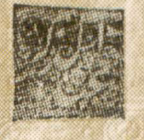
His servant, the [messianic] al-Dhikr (Remembrance)
Seal 2 - to the left of the page beneath the addressee heading [A] above/

Currently unidentified [Afnan family?].
SELECT NOTES AND COMMENTS
Stephen Lambden, 2021.
Note on VIII:7
See Qur'an سورة الأنفال Surat Al-'Anfāl (The Spoils of War) = Qur'an 8:40 - this Qur'anic verse must have been a great source of comfort for the Bab with its promise of divine assistance, help and protection; a comforting expression of excellence! .

"But if they turn away - then know that God is your Protector (mawla). Excellent is the Protector (mawla) and Excellent is the Helper (al-nasir)",.
The Qur'anic verb ni`ma (loosely, `to be excellent' occurs about 18 times in the Qur'an; see Kassis Concordance, 1983: 802-3). It is an irregular verb that only occurs only in the third person singular. It is "described as a verb of praise" and is "the antonym of b ' s" (Kassis ibid). "Occasionally it is suffuxed by mā and is read ni`immā - "how excellent, how bountiful" (ibid, 802). See for further details John Penrice (1818-1892), A Dictionary and Glossary of the Koran, 1st ed. Henry S King, London, 1873; many later editions such as New York: Dover Publications, 2004.(see 148-9).
See further Qur'an 2:271; 3:136, 173; 4:58' 8:40 (see above); 13:24; 16:30; 18:31; 22:78 (twice); 29:58; 37:75: 38:30, 44; 39:74; 51:48; 77:23.
ī ū ā ḍ ḥ ṣ ṭ ẓ



